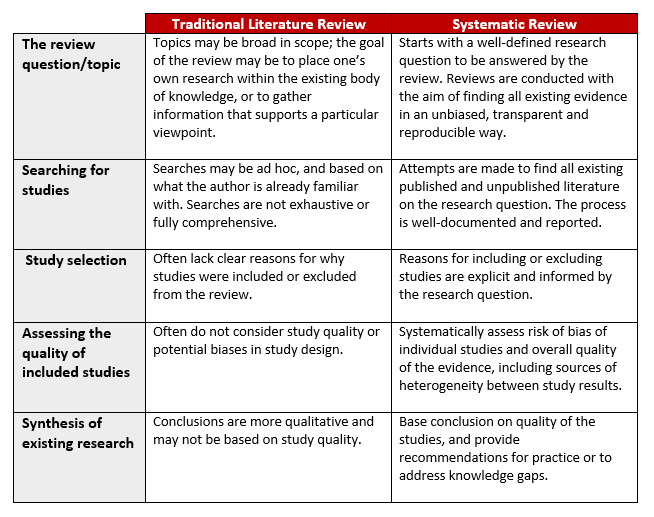What is Evidence Synthesis?
Evidence synthesis refers to a suite of methods that are used to find, synthesize and make sense of knowledge from existing research. Evidence synthesis usually involves systematic and transparent methods to search for studies and may involve an appraisal step to assess the quality of research on a topic.
Systematic reviews are the most well-established and well-known method of evidence synthesis. This is a methodical and comprehensive literature synthesis focused on a well-formulated research question. Its aim is to identify and synthesize all of the scholarly research on a particular topic, including both published and unpublished studies. Systematic reviews are conducted in an unbiased, reproducible way to provide evidence for practice and policy-making and identify gaps in research. They may involve a meta-analysis.
Systematic reviews are much more time-intensive than traditional literature reviews. They usually require a multi-person research team. Before embarking on a systematic review, it is important to determine whether the body of literature warrants one and to clearly identify your reasons for conducting a systematic review. For a list of other types of literature reviews, see this page.
How does a systematic review differ from a traditional literature review?

Other types of literature reviews and evidence synthesis
There are many other types of evidence synthesis methods beyond systematic reviews. For a good overview of evidence synthesis methods, see "A typology of reviews" by Grant and Booth (2009).
Here are a few of the more common methods used to synthesize the literature:
Evidence maps and systematic maps
- Systematically and transparently collects and categorizes existing evidence on a broad question of policy or management importance.
- May critically evaluate existing evidence, but does not attempt to synthesize the results in the way a systematic review would. (see EE Journal and CIFOR)
Meta-analysis
- Statistical technique for combining the findings from disparate quantitative studies.
- Uses statistical methods to objectively evaluate, synthesize, and summarize results.
- A systematic review should always be used to find the literature for a meta-analysis, but not all systematic reviews include this type of quantitative synthesis.
Rapid Review
- Applies Systematic Review methodology within a time-constrained setting.
- Useful for addressing issues needing quick decisions.
- See Evidence Summaries: The Evolution of a Rapid Review Approach
Scoping Review
- Addresses a broader research question or set of questions
- Often conducted in preparation for conducting a systematic review
- Seeks to identify research gaps and opportunities for evidence synthesis
- See Arksey and O'Malley (2005) for methodological guidance.
Umbrella Review
- Reviews other systematic reviews on a topic.
- Often defines a broader question than is typical of a traditional systematic review.
- This type of review is most useful when there are competing interventions to consider.
